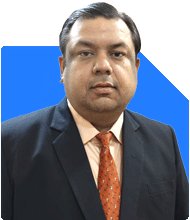Should I Keep Switching Funds in My Life Insurance Mutual Fund or Stick to Equity or Debt?
Ramalingam Kalirajan |8171 Answers |Ask -Follow
Mutual Funds, Financial Planning Expert - Answered on Feb 14, 2025
He has an MBA in finance from the University of Madras and is a certified financial planner.
He is the director and chief financial planner at Holistic Investment, a Chennai-based firm that offers financial planning and wealth management advice.... more

I have invested in India first Life insurance mutual money balance plan in 2017 the premium payable is for 10 years I paid for 5 years then I paid the premium from the fund value in 3 years should I keep on switching the fund value or should I keep in equity or debt please guide
1. Understanding Your Investment
You invested in IndiaFirst Life Insurance Mutual Money Balance Plan in 2017.
The premium is for 10 years.
You paid for 5 years.
You used the fund value for 3 years of premium payments.
You are considering switching between equity and debt.
2. Evaluating Insurance-Linked Investments
This is a ULIP (Unit Linked Insurance Plan).
ULIPs combine insurance with investment.
The returns depend on fund performance.
Charges like mortality, administration, and fund switching apply.
The insurance coverage reduces as the fund value is used for premiums.
Comparing with mutual funds shows ULIPs have higher costs.
3. Impact of Switching Between Equity and Debt
Equity funds give higher returns over the long term.
Debt funds provide stability with lower risk.
Switching between funds depends on market conditions.
Frequent switching may impact long-term growth.
Staying in equity is better if your horizon is long.
Debt is preferable if you need stability and safety.
4. Should You Continue or Exit?
Exiting before 10 years may lead to charges.
Your past premiums will be affected if you stop now.
If the fund is underperforming, evaluate other investment options.
Mutual funds may offer better returns with lower costs.
If your insurance need is separate, ULIPs may not be ideal.
5. Comparing ULIPs vs Mutual Funds
Mutual funds have better transparency and lower costs.
ULIPs have lock-ins and higher charges.
Mutual funds offer flexibility in withdrawals.
ULIPs require continuous premium payments for benefits.
Mutual funds are tax-efficient in the long term.
6. Alternative Investment Approach
If insurance is your goal, a pure term plan is better.
If wealth creation is the goal, mutual funds offer more options.
If the ULIP has high charges, reinvesting in mutual funds is better.
If the fund value is low, continuing may not be beneficial.
Checking performance against benchmarks helps in decision-making.
7. Tax Considerations on Exit
ULIP maturity is tax-free if the premium is below Rs 2.5 lakh per year.
If surrendered before maturity, tax is applicable.
Mutual fund taxation applies differently based on fund type.
Evaluating tax impact before exiting is necessary.
Finally
If your ULIP charges are high and fund performance is low, consider exiting and investing in mutual funds. If insurance is important, a term plan with a mutual fund investment is a better approach. Monitoring the fund value and charges will help in making a better decision.
Best Regards,
K. Ramalingam, MBA, CFP
Chief Financial Planner
www.holisticinvestment.in
https://www.youtube.com/@HolisticInvestment
Best Regards,
K. Ramalingam, MBA, CFP,
Chief Financial Planner,
www.holisticinvestment.in
https://www.youtube.com/@HolisticInvestment
You may like to see similar questions and answers below
Ramalingam Kalirajan |8171 Answers |Ask -Follow
Mutual Funds, Financial Planning Expert - Answered on May 02, 2024
Ramalingam Kalirajan |8171 Answers |Ask -Follow
Mutual Funds, Financial Planning Expert - Answered on Sep 06, 2024
Ramalingam Kalirajan |8171 Answers |Ask -Follow
Mutual Funds, Financial Planning Expert - Answered on Oct 03, 2024
Milind Vadjikar |1144 Answers |Ask -Follow
Insurance, Stocks, MF, PF Expert - Answered on Jan 22, 2025
Dr Dipankar Dutta |1071 Answers |Ask -Follow
Tech Careers and Skill Development Expert - Answered on Apr 02, 2025
Radheshyam Zanwar |1511 Answers |Ask -Follow
MHT-CET, IIT-JEE, NEET-UG Expert - Answered on Apr 01, 2025
Mayank Chandel |2155 Answers |Ask -Follow
IIT-JEE, NEET-UG, SAT, CLAT, CA, CS Exam Expert - Answered on Apr 01, 2025
Mayank Chandel |2155 Answers |Ask -Follow
IIT-JEE, NEET-UG, SAT, CLAT, CA, CS Exam Expert - Answered on Apr 01, 2025
Mayank Chandel |2155 Answers |Ask -Follow
IIT-JEE, NEET-UG, SAT, CLAT, CA, CS Exam Expert - Answered on Apr 01, 2025
Mayank Chandel |2155 Answers |Ask -Follow
IIT-JEE, NEET-UG, SAT, CLAT, CA, CS Exam Expert - Answered on Apr 01, 2025
Mayank Chandel |2155 Answers |Ask -Follow
IIT-JEE, NEET-UG, SAT, CLAT, CA, CS Exam Expert - Answered on Apr 01, 2025
Yogendra Arora |31 Answers |Ask -Follow
Tax Expert - Answered on Apr 01, 2025
Mayank Chandel |2155 Answers |Ask -Follow
IIT-JEE, NEET-UG, SAT, CLAT, CA, CS Exam Expert - Answered on Apr 01, 2025
Anu Krishna |1576 Answers |Ask -Follow
Relationships Expert, Mind Coach - Answered on Apr 01, 2025


























